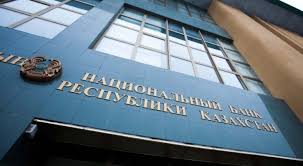 Losing control of an $18 billion pension fund may give the Kazakh central bank the independence it needs to stick with a shift to inflation targeting that’s upended the nation’s currency this year.
Losing control of an $18 billion pension fund may give the Kazakh central bank the independence it needs to stick with a shift to inflation targeting that’s upended the nation’s currency this year.
The plan, announced by President Nursultan Nazarbayev in a speech to the nation on Monday, will also strip the central bank of its authority over a problem-loan fund and “other financial institutions.” That’s needed to “eliminate the National Bank’s institutional defects,” Nazarbayev said, calling for control over retirement savings to be transferred to private Kazakh or foreign companies next year.
With the independence of central banks in focus from Indonesia to Poland, the move by Kazakhstan may free policy makers to focus on stabilizing the tenge after it was devalued twice in as many years. Kairat Kelimbetov, who was replaced as governor by Daniyar Akishev in November, oversaw the consolidation of savings into a single state-run pension fund, which was absorbing assets from private companies including Halyk Bank, owned by Nazarbayev’s daughter and son-in-law.
“Now that the National Bank of Kazakhstan will be spared from its non-core responsibilities, it can focus more on implementing its inflation-targeting mandate,” Ekaterina Vlasova, an economist at Citigroup Inc. in Moscow, said by e- mail. The “decision should boost its credibility, not least because it eliminates the conflicts of interest inherent to situations when a central bank artificially substitutes for a whole sector of the financial market.”
Abandoning Defense
Kazakhstan is battling its slowest pace of growth since 2009 after crude prices plunged in the past year. Gross domestic product must climb by more than 5 percent a year, Nazarbayev said, compared with the 1.2 percent forecast for 2015. The central bank was forced to abandon its defense of the tenge in August, weakening it 36 percent to boost competitiveness after Russia and China devalued their currencies.
In his speech, Nazarbayev supported steps by Akishev to move away from supporting the currency by spending reserves. As part of its inflation-targeting regime, the central bank should bring price growth to 4 percent in the medium term and “fully use the mechanism of flexible changes in interest rates,” he said.
Focused, Stronger
“This leaves the National Bank with a more focused and stronger mandate to do what a central bank should do,” said Sabit Khakimzhanov, head of research at Halyk Finance. “Definitely, the change is for the better. But it by no means guarantees success.”
Kazakhstan will privatize all state-run companies and boost investment by $10 billion a year, Nazarbayev, who has ruled the Central Asian country for more than a quarter of a century, said in his speech. Government income will drop by 20 percent, forcing state companies and private businesses to “live within their means,” he said. His administration could foster a “new wave” of wealthy investors through sales of strategic assets, according to the president.
Kazakhstan started merging retirement savings in 2013 under Kelimbetov’s predecessor at the central bank, Grigori Marchenko. Halyk’s pension fund had 1.1 trillion tenge ($3.6 billion) of assets under management in 2012, contributing about 14 percent of the bank’s net income.
Focusing the regulator’s responsibilities is a “very rational decision that should help strengthen the Kazakh institutional framework,” said Oleg Kouzmin, an analyst at Renaissance Capital in Moscow. “It’s good to create a proper functioning body and take non-core activities from the central bank. Each one should be doing its job.”
The Washington Post, 30.11.2015




